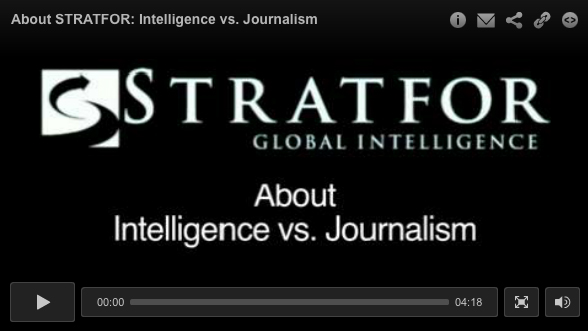 Per a twitter source, Wikileaks will begin publication tomorrow of some 5 million emails from the files of an entity called Stratfor:
Per a twitter source, Wikileaks will begin publication tomorrow of some 5 million emails from the files of an entity called Stratfor:
Government and diplomatic sources from around the world give Stratfor advance knowledge of global politics and events in exchange for money. The Global Intelligence Files expose how Stratfor has recruited a global network of informants who are paid via Swiss banks accounts and pre-paid credit cards. Stratfor has a mix of covert and overt informants, which includes government employees, embassy staff and journalists around the world.
The material shows how a private intelligence agency works, and how they target individuals for their corporate and government clients. For example, Stratfor monitored and analysed the online activities of Bhopal activists, including the "Yes Men", for the US chemical giant Dow Chemical. The activists seek redress for the 1984 Dow Chemical/Union Carbide gas disaster in Bhopal, India. The disaster led to thousands of deaths, injuries in more than half a million people, and lasting environmental damage.
 Per Gizmodo,
Per Gizmodo,Wikileaks says that the emails also reveal the creation of a parallel organization called StratCap. Apparently, this organization would use Stratfor's network of informants to make money in financial markets. Wikileaks claims that the emails show how then-Goldman Sachs Managing Director Shea Morenz and Stratfor CEO George Friedman put StratCap in motion in 2009.[Emphasis above and below in this post is supplied.] More at the links above.
* * * * *
Stratfor CEO has resigned following this clusterfuck. It seems the company's security hasn't been fixed yet, because Anonymous has captured and published his resignation email.
A press release from the Yes Men notes,
Many of the Bhopal-related emails . . . reveal concern that . . . the Bhopal issue might be expanded into an effective systemic critique of corporate rule, and speculate at length about why this hasn't yet happened – providing a fascinating window onto what at least some corporate types fear most from activists.
"[Bhopal activists] have made a slight nod toward expanded activity, but never followed through on it—the idea of 'other Bhopals' that were the fault of Dow or others," mused Joseph de Feo, who is listed in one online source as a "Briefer" for Stratfor.
"Maybe the Yes Men were the pinnacle. They made an argument in their way on their terms—that this is a corporate problem and a part of the a [sic] larger whole," wrote Kathleen Morson, Stratfor's Director of Policy Analysis.
"With less than a month to go [until the 25th anniversary], you'd think that the major players – especially Amnesty – would have branched out from Bhopal to make a broader set of issues. I don't see any evidence of it," wrote Bart Mongoven, Stratfor's Vice President, in November 2004. . . .
Mongoven even speculates on coordination between various activist campaigns that had nothing to do with each other. "The Chevron campaign [in Ecuador] is remarkably similar [to the Dow campaign] in its unrealistic demand. Is it a follow up or an admission that the first thrust failed? Am I missing a node of activity or a major campaign that is to come? Has the Dow campaign been more successful than I think?" It's almost as if Mongoven assumes the two campaigns were directed from the same central activist headquarters.
Just as Wall Street has at times let slip their fear of the Occupy Wall Street movement, these leaks seem to show that corporate power is most afraid of whatever reveals "the larger whole" and "broader issues," i.e. whatever brings systemic criminal behavior to light. "Systemic critique could lead to policy changes that would challenge corporate power and profits in a really major way," noted Joseph Huff-Hannon, recently-promoted Director of Policy Analysis for the Yes Lab.
 (You can see a Yes Man impersonating a Dow Chemical spokesman in an interview with an unwitting BBC here, accepting full responsibility for the 1984 Bhopal disaster.)
(You can see a Yes Man impersonating a Dow Chemical spokesman in an interview with an unwitting BBC here, accepting full responsibility for the 1984 Bhopal disaster.)



.jpg)



.jpg)

.jpg)

.jpg)

No comments:
Post a Comment